Table of Contents
Let's face it, nobody wants to deal with foundation water damage. Not only is it unsightly, but it can also lead to severe structural problems and even pose a risk to your family's safety.
The good news is that there are steps you can take to protect your home. By understanding the causes and signs of foundation water damage, you can proactively address any potential issues.
We'll explore how water damages your foundation, the signs of foundation water damage, and how you can prevent foundation water damage. Finally, we'll review what to do if you discover significant foundation water damage.
What Are the Signs of Foundation Water Damage?
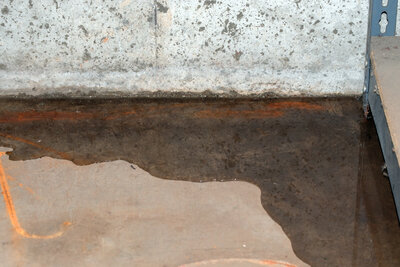
No one wants to think about foundation problems, but knowing the signs is essential. Early detection can prevent costly repairs.
Here are a few red flags to watch out for:
- Cracks. Look for hairline cracks in your foundation walls, floors, or driveway. These cracks can indicate shifting soil and potential water damage.
- Moldy Matters. Mold and mildew growth in your basement or crawlspace is a clear sign of moisture issues.
- Standing Water. If you notice puddles of water around your foundation after rain, it's a red flag. This could indicate poor drainage and potential water infiltration.
- Doors and Windows Are Out of Whack. Are your doors and windows suddenly sticking or becoming difficult to open and close? This could be a sign that your foundation is shifting.
- Bowing Walls. Bowing walls indicate significant pressure on your foundation, likely from water intrusion.
Don't ignore these warning signs! Ignoring foundation water damage can lead to serious structural problems and costly repairs. If you notice any of these issues, it is crucial to contact a qualified foundation repair specialist for an assessment.
How Does Water Damage My Foundation?
Water can wreak havoc on your home's foundation in a few sneaky ways:
- Erosion. Heavy rainfall and poor drainage can erode the soil around your foundation, leaving it unsupported and vulnerable to shifting and settling.
- Hydrostatic Pressure. When soil around your foundation becomes saturated with water, it exerts pressure against your home's walls. This constant pressure can cause cracks, bowing, and even shifting of the foundation itself.
- Expansive Soils. Some types of soil, like clay, expand when they absorb water and shrink when they dry out. This constant movement stresses your foundation, leading to cracks and instability.
These factors, combined with other issues like poor grading and inadequate drainage, can significantly weaken your home's foundation. Excess water in your basement could damage your home and compromise your home's structural integrity.
How Can I Prevent Water Damage to My Foundation?
Preventing water damage begins with proactive measures to keep water away from your home’s foundation. Follow these tips to safeguard your property:
Ensure Proper Drainage
The first step to ensuring your foundation is protected is to make sure you have good drainage. Your yard should slope at least 6 inches over a 10-foot span to keep water moving away from your foundation in the event of rain or moving water.
Keep your gutters clean, too. If they're full, a big rain will dump sheets of water over the side of the house and straight into the ground, saturating it further and even eroding the ground that supports your foundation. If you don't feel comfortable cleaning your gutters, call in a pro to help.
Keep Your Sump Pump Working
A sump pump is your next defense against foundation damage. Certain homes, especially those with basements, feature a sump basin that gathers water from rain or groundwater seepage and pumps it safely through a sump pump.
Depending on your municipality, water may be pumped into sewage lines, storm drains, or dry wells. If you're installing or maintaining a sump pump in your home, ensure you know your town's drainage requirements.
Test your sump pump by filling its basin with water. Watch that the buoy rises, the pump turns on, and the water level lowers. Test your backup pump the same way.
Check for Leaks and Repair Them Immediately
Minor leaks can damage the entire home, including the foundation. Take the time to check for leaks under sinks, behind toilets, and in the foundations of washing machines. Look for dark spots where pipes are dripping on floors, ceilings, or walls. Also, ensure your toilet is sealed correctly and doesn't rock on its foundation.
Check your roof, too, to ensure water isn't trickling from the top down. Your roof may seem like it can't affect your foundation, but remember that all water falls. It's important to keep your home dry throughout to prevent water damage at the base.
Inspect Your Foundation
Take a critical look at your foundation to ensure water damage isn't threatening your home. Start by looking for signs of water damage in and around your home. Walk the perimeter of your home and look for moisture or mold.
Do you have standing puddles near the house after rain? Are walls buckling or leaning? Have doors or windows become swollen with moisture? Cracks in your walls could be signs of a shifting foundation.
What Should I Do if I Find Significant Foundation Water Damage?
The steps you take after finding foundation water damage depends on the extent of the water damage.
Minor Seepage After Rain Storms
Notice some water seepage after a recent storm? Here's what to do.
Check & Clean Your Gutters
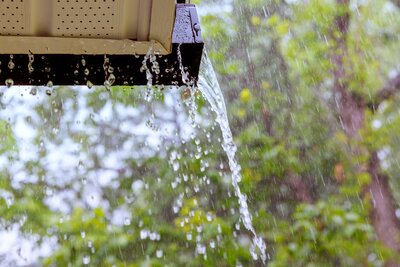
First, check your gutters! Ensure they're clear of leaves and debris. Overflowing gutters can send water cascading down your house, saturating the soil around your foundation.
Ensure Your Gutters Discharge Away From Your Foundation
Next, ensure your gutters are properly discharging water. If they're dumping water close to your foundation, consider extending them further away or installing flexible drain pipes to direct water safely away from your home. Your downspout extension should be at least 10 feet from your home.
Here's a picture of what gutter discharge near your foundation may look like:
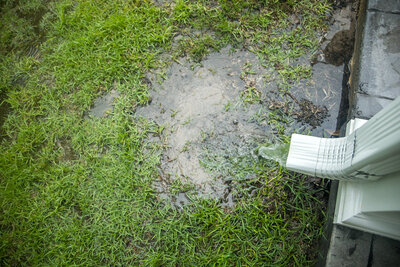
Here's a picture of a flex-drain discharge pipe installed on a gutter downspout:
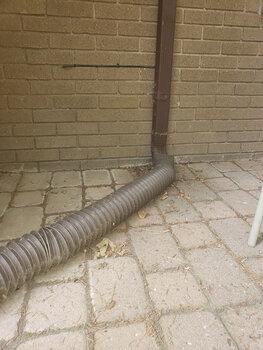
If you're still experiencing water seepage, call the experts. A reputable basement waterproofing company can diagnose the issue and recommend the best solution to protect your home.
Major Foundation Water Damage
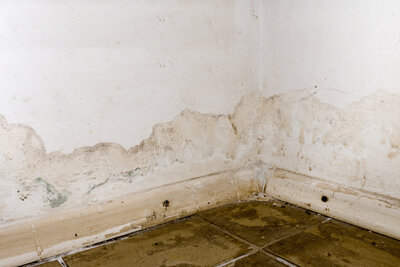
Discovering major foundation water damage can be unsettling.
Don't panic! Here's what to do:
- Call a Foundation Repair Company. Contact a reputable foundation repair company for an immediate assessment. They can accurately diagnose the problem and recommend the best course of action.
- Call Your Insurance Agent. Contact your homeowner's insurance agent. Review your policy and discuss potential coverage for foundation water damage.
- Call a Water Damage Restoration & Clean-up Company. You'll need a professional water damage company. They can help mitigate immediate damage, such as water extraction and mold remediation, while the foundation repair is underway. At ServiceMaster Restore, we do it all and are ready to help you!
Remember, prompt action is key to minimizing damage and restoring your home.
Trust ServiceMaster Restore!
If water has entered your home through the foundation or you've experienced a disaster and need help with recovery, contact the experienced professionals at ServiceMaster Restore. Our crews are available 24/7/365 to assist.
Recommended Further Reading

